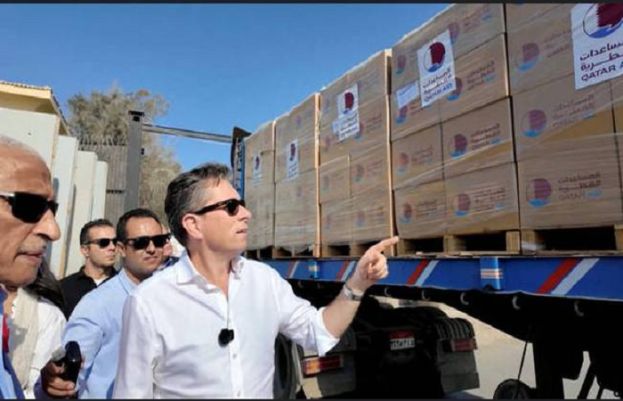The United Nations’ humanitarian chief on Saturday assessed the enormous challenge of restoring essential services across the war-ravaged Gaza Strip, as Israel received the remains of another hostage from the October 7 attack, marking the second week of the ceasefire. In a small convoy of white UN vehicles, relief coordinator Tom Fletcher and his team navigated through the wreckage of demolished buildings to inspect a wastewater treatment facility in Sheikh Radwan, north of Gaza City. “I drove through here seven or eight months ago when most of these buildings were still standing. To see this level of destruction vast stretches of the city turned into wasteland it’s absolutely heartbreaking,” Fletcher told AFP. Once densely populated with over two million Palestinians, Gaza’s cities now lie in ruins after two years of relentless bombardment and fierce clashes between Hamas and the Israeli army. A little over a week after U.S. President Donald Trump helped broker the truce, the main border crossing with Egypt remains closed, though hundreds of aid trucks continue to enter daily through Israeli checkpoints to distribute relief supplies. Hamas has returned the last 20 living hostages in its custody and has begun transferring the remains of 28 others who died during captivity. On Friday night, it handed over the body of Eliyahu Margalit, 75, who was killed in the October 2023 attack that triggered the Gaza war. Digging latrines Surveying the damaged pumping equipment and a grim lake of sewage at the Sheikh Radwan wastewater plant, Fletcher said the task ahead for the UN and aid agencies was a “massive, massive job”. The British diplomat said he had met residents returning to destroyed homes trying to dig latrines in the ruins. “They’re telling me most of all they want dignity,” he said. “We’ve got to get the power back on so we can start to get the sanitation system back in place. “We have a massive 60 day plan now to surge in food, get a million meals out there a day, start to rebuild the health sector, bring in tents for the winter, get hundreds of thousands of kids back into school.” According to figures supplied to mediators by the Israeli military’s civil affairs agency and released by the UN humanitarian office, on Thursday some 950 trucks carrying aid and commercial supplies crossed into Gaza from Israel. Relief agencies have called for the Rafah border crossing from Egypt to be reopened to speed the flow of food, fuel and medicines, and Turkey has a team of rescue specialists waiting at the border to help find bodies in the rubble.- Hostage remains -Israel’s Prime Minister Benjamin Netanyahu approved the ceasefire but is under pressure at home to restrict access to Gaza until the remaining bodies of the hostages taken during Hamas’s brutal attacks have been returned. On Saturday, his office confirmed that the latest body, returned by Hamas via the Red Cross on Friday night, had been identified as Margalit, the elderly farmer who was known to his friends at the Nir Oz kibbutz as “Churchill”. “He was a cowboy at heart, and for many years managed the cattle branch and the horse stables of Nir Oz,” said the Hostages and Missing Families Forum, a support group founded by relatives of the hostages. “He was connected to the ‘Riders of the South’ group whose members shared a love of horseback riding for over 50 years. On October 7, he went out to feed his beloved horses and was kidnapped from the stable.” Margalit had been married with three children and three grandchildren. His daughter Nili Margalit, also taken hostage, was freed during the war’s first brief truce in November 2023. In a statement confirming he had been identified and his remains returned to his family, Netanyahu’s office said “we will not compromise … and will spare no effort until we return all of the fallen abductees, down to the last one”. Hamas spokesman Hazem Qassem said on Friday that the group “continues to uphold its commitment to the ceasefire agreement… and it will continue working to complete the full prisoner exchange process”. Under the ceasefire agreement between Israel and Hamas, negotiated by Trump and regional mediators, the Palestinian militant group has returned all 20 surviving hostages and the remains of 10 out of 28 deceased ones.
UN aid chief says rebuilding Gaza will be a ‘massive challenge’ after tour of devastation

